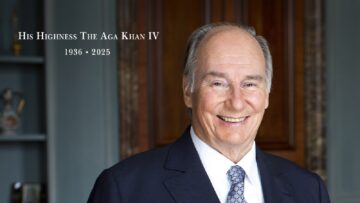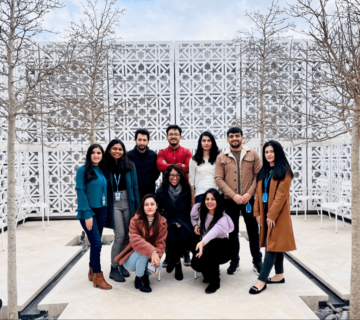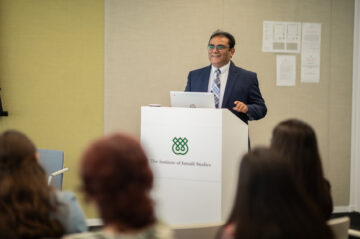Issues and questions arising around representations of Islam was another major area of focus and debate. Several areas were discussed including whether all representations of Islam and Muslims are subject to ideological contestation, and moreover whether all such representations are entrapped within essentialist discourses, both in the West and inside Muslim societies.
Dr. Farouk Mitha, (Class of 1986), presented a paper entitled ‘The Films of Abbas Kiarostami: Framing the Burdens of Contemporary Muslim Identities,” which addressed these questions by examining the effects of the politics of Muslim identity on the work of a major and internationally renowned Iranian filmmaker working in the Islamic Republic of Iran.
Karim H. Karim (Class of 1984) also presented a paper at this conference entitled: “Media and Societal Discourses on Western-Muslim Relations”. This paper discussed the way in which the mass media draw on and amplify societal discourses that polarize conceptions of “the West” and “the Muslim world.” Dominant narrations of Western-Muslim interactions have emphasised conflict rather than the cultural, scientific and trading relations carried on over many centuries and into the present.
Karim noted that Christians have long been present in most majority-Muslim countries and recent migration has made Islam the second-largest religion in almost all Western states. Notwithstanding some journalists’ attempt to provide a broader picture, the media’s primary focus on conflict obscures the many points of harmony between the two civilisations and the possibilities for further convergence.
The contested terrain of Muslim identities and the challenges of studying the contextual factors shaping these identities were eloquently mapped out in two keynote addresses at the conference: H.R.H. Prince El Hassan bin Talal of Jordan’s taped speech at the opening reception and the banquet speech by Professor E. Roger Owen of Harvard University. The conference ended on a somewhat optimistic note, echoing His Highness the Aga Khan’ s conviction that the conflicts between the Muslim World and the West are not inevitable but rooted in a ‘clash of ignorance’ that can be overcome through education and dialogue.






